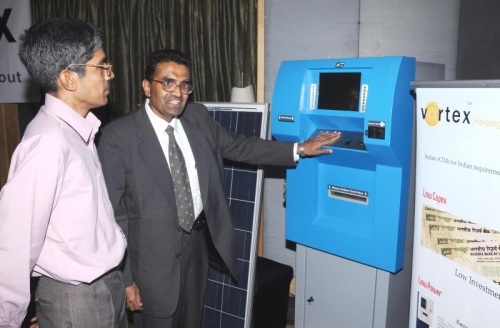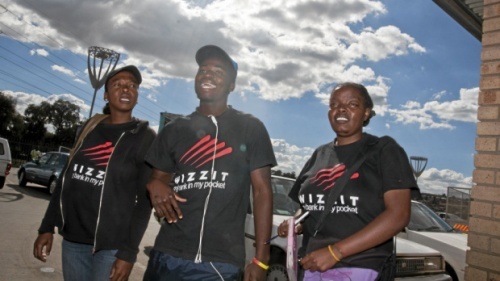


“Lack of access to banking and credit impedes the economic empowerment of low-income individuals and hinders growth in the developing world,” according to Susan Chaffin of Business Call to Action (BCta) global initiative, which encourages private sector efforts to develop inclusive business models that can have both commercial success and a positive impact in development. It is though a false impression to see lack of access to banking as largely a technology or underdeveloped/developing country problem - from "payday loans" (Top Photo) to exploitive check cashing services, the US is one of the more "under-banked" populations.
Launch in India & South Africa:
Two companies from India and South Africa announced today their commitment to provide banking services to 30 million low-income people living in rural areas by 2015, as part of their support for a United Nations-backed initiative to fight poverty. The India-based company Vortex Engineering (Middle Photo) and South Africa’s Wizzit Bank (Bottom Photo) will join the Business Call to Action (BCta) global initiative back by UNDP (United Nations Development Program), “We welcome Vortex and Wizzit as they seek to scale up activities that not only represent a business opportunity but also have tremendous potential to positively impact low-income communities in India and South Africa,” says Ms. Chaffin. (See Film Report: “What is UNDP?” -
diplomaticallyincorrect.org/films/movie/what-is-undp-one-day/27368
Access to Banking Machines:
Vortex Engineering will contribute by disseminating solar-powered cash machines tailored to rural communities’ needs, while Wizzit Bank will expand its access to credit for poor rural communities. 10,000 solar-powered ATMs designed to withstand difficult weather conditions, erratic power supply, and lower literacy levels among cash dispenser users will be set-up by Vortex. The machines are expected to provide access to formal banking for 30 million people mostly in rural and semi-urban areas – many earning as little as $1 a day. Read: - “Broadband as Instrument for Inclusion” -
diplomaticallyincorrect.org/films/blog_post/broadband-as-instrument-for-inclusion-by-susan-sacirbey/38302
Mobile Phone Banking:
Wizzit Bank in South Africa is to provide personal loans to 10,000 people. Wizzit’s customers have been using mobile phones for making and receiving payments, along with a debit card that can also be used at ATMs and stores. The company is now expanding its range of services to allow users, who usually live far from bank branches, to access microloans and credit through their phones. There are also programs in place to enhance access to mobile phones – Read: -
haitiemergency.com/films/blog_post/mobile-phone-access-for-poor-people-un-backed-program-by-ambassador-mo/32976
Lack to Banking Services – Global Condition for Poorer Working Class in US:
According to the World Bank (WB), more than half of the adult population in South Africa and India lack access to formal banking, “in contrast to the Netherlands, for example, where the entire adult population has access to banking services.” Not certain that I’m convinced by the latter data – for example does it include illegal immigrants. However, lack of access to banking is not limited to underdeveloped/developing countries. In the US it is estimated that over 20% of the population does not have a bank account. It is not technology but other social and range of other conditions that exclude such people and even a larger percentage of US population is “under-banked.” The gap has been filled by exploitive pawnshops, check-cashing services and “pay-day” loans all charging exorbitant fees/rates. The sense of exclusion, disenfranchisement and lack of opportunity is becoming a substantial if not yet dominant part of US society.
By Ambassador Muhamed Sacirbey
Facebook – Become a Fan at “Diplomatically Incorrect”
Twitter – Follow us at DiplomaticallyX
International Financial Crisis Channel” -
diplomaticallyincorrect.org/c/international-financial-crisis





